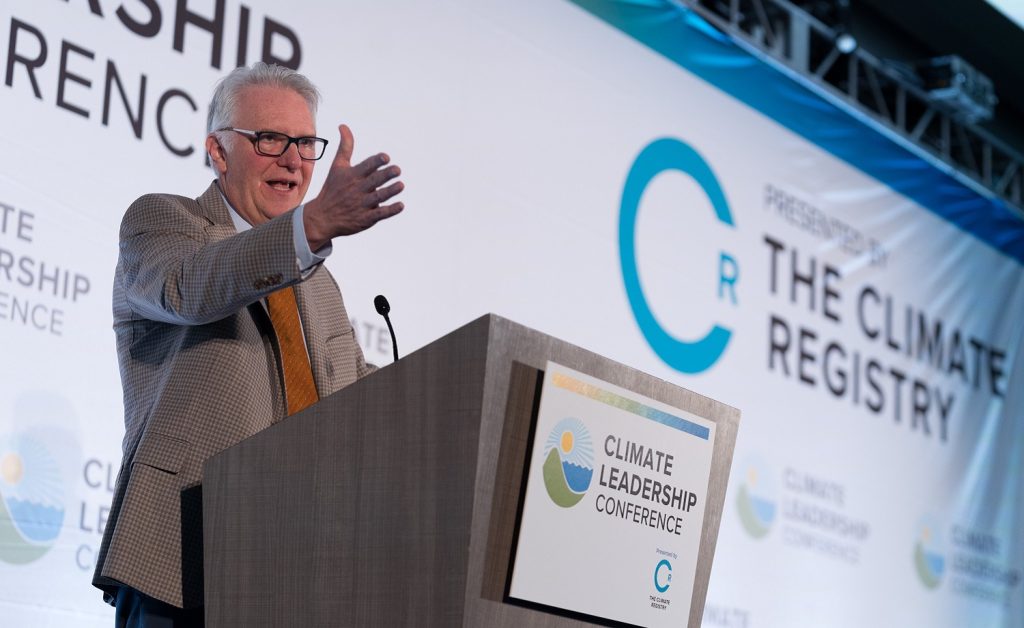
In Cleveland’s post-industrial era, good and bad remnants of that era endure such as this steel mill ore dock along the Cuyahoga River at Scranton Peninsula, where more than 600 housing units are under construction in the shadows of Downtown Cleveland’s skyscrapers. Addressing the freshwater impacts and opportunities of those good and bad legacies is among the charges of Cuyahoga County’s new Fresh Water Institute (KJP). CLICK IMAGES TO ENLARGE THEM.
Institute to focus on leveraging water resources
Cuyahoga County Executive Chris Ronayne announced a $250,000 grant from the Cleveland Foundation to support the creation of a Fresh Water Institute in Greater Cleveland. He made the announcement yesterday during the Climate Leadership Conference in Downtown Cleveland.
Funding from the Cleveland Foundation will add to federal dollars secured in March. U.S. Rep. Shontel Brown (D-11, Warrensville Hts.) earmarked $500,000 to develop the project. The foundation’s grant will fund a dedicated project manager who will lead the launch, development, and implementation of the Fresh Water Institute.
There are federal fresh water institutes in West Virginia, associated with the U.S. Fish & Wildlife Service, and in Manitoba, associated with Parks Canada. Ronayne said the Cuyahoga County-based institute will advocate specifically for this region and serve as a local beacon of education, advocacy and economic development dedicated to preserving vital water resources.
“The Cleveland Foundation’s investment in the Fresh Water Institute is a testament to its commitment to environmental sustainability,” Ronayne said in a written statement. “This funding will launch the Fresh Water Institute to address critical water issues and support initiatives that will benefit both our environment and communities throughout the county.”
However, the county has not provided any of its own funding to support the institute. It remains to be seen if it will. “At this point, no decisions have been made,” said Cuyahoga County Communication Director Kelly Woodard in an e-mail to NEOtrans.
Nearly a year ago in his state of the county address, Ronayne revealed that he would be pursuing funding to create the institute. As envisioned, the Fresh Water Institute will focus on three three endeavors — education and research, advocacy and access, as well as economic development, he said.
The Fresh Water Institute will inspire learners and explorers to understand the environmental impact of our waterways. The county will launch an educational engagement program to work with local students to delve into the importance of the Great Lakes and gain exposure to freshwater career opportunities.
In advocacy, the government’s role in protecting our natural resources is critical, Ronayne said. The Fresh Water Institute will convene community partners on crafting a shared agenda to advance policies affecting freshwater development and access.
The Fresh Water Institute will focus on creating a blueprint to attract freshwater-dependent industries to Cuyahoga County and create water-focused jobs to boost our economy and workforce, he added. The county’s climate and sustainability initiatives are described at cuyahogacounty.gov/sustainability.
“The Fresh Water Institute will be a first-of-its-kind center for research, stewardship and economic development that leverages our region’s extraordinary freshwater resources,” said Lillian Kuri, president and CEO of the Cleveland Foundation. “The institute builds on the community’s progress to position Cleveland as a global leader in freshwater innovation and exemplifies the kind of cross-sector collaboration that sets our region apart.”
“The Fresh Water Institute will be a leader in advancing innovative solutions for water sustainability, and this funding will bolster our efforts. The Institute’s work is essential for protecting the water resources crucial to the health, economy, and well-being of our region,” Ronayne said.
END





